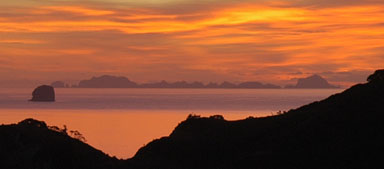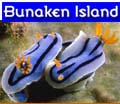
New Zealand Dive Guide
New Zealand offers some fantastic temperate water diving opportunities.
This page provides a brief summary of some of New Zealand's best diving. It's not an exhaustive list of New Zealand dive sites but includes many of the best spots.
| |
|
|
|
|
|
|
|
 |
|
|
|
||||
 |
|
||||||
| |
|
||||||
 |
|
|
|||||
| |
|
||||||
| |
|
|
|||||
| |
|
||||||
 |
|
|
|||||
 |
|
||||||
 |
 |
|
|||||
 |
|
||||||
![]() The Three Kings Islands
The Three Kings Islands
The Three Kings Islands are legendary amongst New Zealand's fraternity
of crusty divers. Wild and unspoiled they offer perhaps New Zealand's
best diving.
Located about 30 nautical miles to the north west of the top of New Zealand, the shelter available there is limited and it's not a place you want to be when the weather turns sour.
Houhora, the northern-most port from which charter boats usually depart is about 80 nauitcal miles from the Kings and is a steam of 10 or so hours in a displacement vessel.
Vast expanses of ocean converge around the Three Kings and well up from over 1000 metres depth. Currents are unpredictable and can be savage but the underwater visibilty is always good and never seems to drop below 20 metres.
Strangely, the water temperature is typically 2 degrees cooler than on the mainland coast.
There are no regular dive charters to the Three Kings. The months of February and March provide the best opportunity for warm, settled weather and are generally regarded as the best time to visit the Kings.
 |
Links
Three Kings Adventure
Three Kings 2006 Trip
High resolution marine chart NZ4111 Three Kings Islands (3.0 MB tiff - right click and save to hard disk recommended)
High resolution marine chart NZ41 North Cape (9.7 MB tiff - right click and save to hard disk recommended)
![]() The Poor Knights Islands
The Poor Knights Islands
The Poor Knights Islands are undoubtedly New Zealand's best known dive
location and rightly so. A marine reserve since 1981, they are easily
accessible from Auckland, New Zealand's largest city, and offer superb
quality diving.
 |
Skip's Underwater Image Gallery contains many underwater images from the Knights - just surf around the site.
Visibility is typically 15 to 20 metres but can be as high as 30 metres or more. Plankton blooms in spring (around October) can sometimes reduce visibility to 8 metres. Water temperature ranges from 15 (August) to 22 (March) degrees C.
The charter fleet which services the Knights is based in Tutukaka and offers services ranging from snorkeling for kids through to deep technical diving.
Links
Map of Poor Knights dive sites.
Poor Knights Galleries: 1, 2, 3
Yukon Charters - my favourite charter operator. Highly recommended!
Dive! Tutukaka - New Zealand's biggest charter operator with a fleet of 5 boats. Professional, winner of tourism industry awards and Skip's Underwater Image Gallery endorsed.
![]() Goat
Island
Goat
Island
Goat Island diving is not the most adventurous but it does offer
a unique opportunity to get close to hundreds of fish. As New
Zealand's first marine reserve (established 1977) the fish are very
well aquainted with divers and greet them enthusiastically with
the occasional finger nip.
Situated only a little over an hours drive north of Auckland, Goat Island
attracts divers and snorkelers in their hundreds on a good summer weekend.
Despite this congestion, it's a wonderful place to get close to nature,
make friends with the undersea community and snap some fish portraits
if you're into underwater photography.
![]() The Mercury Islands and Mercury Bay
The Mercury Islands and Mercury Bay
The Mercs are a picturesque collection of dozens of islands and rocks offering
a huge range of shallow and deep water diving opportunities.
 |
 |
 |
 |
Bathed in warm, clear
offshore waters, the Aldermen have many similarities to the Poor Knights.
Although they lack many of the special critters found at the Knights,
they offer some beautiful diving in a non-reserve environment allowing
fishing and gathering of crayfish and shellfish.
Castle Rock drops straight to 50 metres all around it and has a great
air bubble cave on the northern side in 7 metres of water allowing you
to chat comfortably with your buddy during deco stops.
Links
Map of The Aldermen with some dive sites noted.
Jimmy's Black Coral Reef - a deep water reef.
The Thirty Six - a deep water reef.
White Island
White is New Zealand's most active volcano is well worth a visit even if you don't dive there. The diving is superb and rivals the Poor Knights for water clarity and rich marine life. Laison's Reef, Diadema Reef and Homestead Reef on a good day are about as good as diving gets in New Zealand - heck, as good as anywhere!
![]() Fiordland
Fiordland
Located
in the south western corner of the South Island, Fiordland is a huge
area of unspoiled wilderness. Here, the rainfall is so high that the
deep sheltered fiords often have a layer of dark, tanin stained fresh
water floating on top of the salt water.
 |
This reduces light levels underwater with the result that critters
normally found in very deep water occur at shallow depths. Large black
coral trees grow at depths as shallow as 5 metres, precious red coral
normally found well beyond diving depths can be found in less than 15
metres and deep water sea pens can be found within easy diving depths.
Water temperature is typically 12 or 13 degrees C but the fresh water layer can be considerably cooler. Visibility is almost always good - 20 metres plus - but it can be dark and gloomy.
Wild, unspoiled, stunningly beautiful! Some of New Zealand's best diving - 'nough said.
Links
Dusky Sound 2002
Doubtful Sound 2003
Doubtful Sound 2004
Dusky Sound 2005
Preservation Inlet & Dusky Sound 2006
Preservation Inlet 2007
![]() The Kermadec Islands
The Kermadec Islands
The Kermadec Islands form one of the world's largest marine reserves.
Located approximately 1000 kilometres north east of the New Zealand
mainland they're so remote and difficult to get to that few divers ever
get there. Few divers except Skip! Yup, I finally got there in 2001
after dreaming about it for years.
 |
Being geographically isolated and protected as a marine reserve, the life
underwater is truly unique. It consists of an interesting mixture of
temperate water species familiar from the New Zealand mainland mixed
with species better known from the tropics.
At the time of my visit in March, the waters were alive with galapagos
sharks which followed you about on every dive and provided a constant
source of interest and never ending underwater photographic opportunities.
The other big underwater stars were the spotted black grouper which
grow to a considerable size and are sometimes so friendly that you can
cuddle and kiss them if you really, really want to.
I loved the Kermadecs; here's the story
I wrote about my trip there.
© 2001 - 2008 ianskipworth.com






